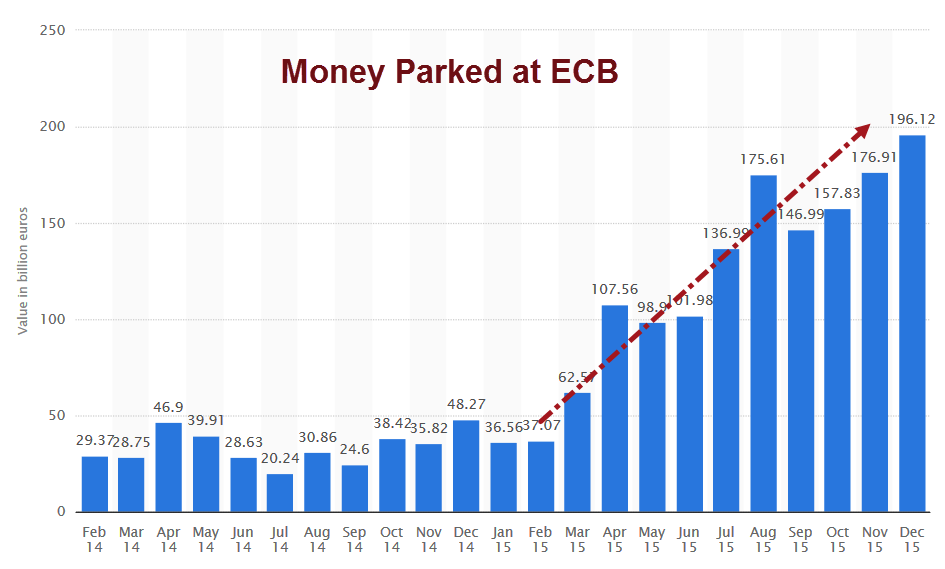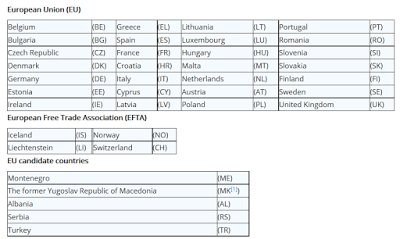Fear!
Money parked at the ECB at a negative rate of 0.3% hit a new high at the beginning of 2016.
Above chart from Statista.
Possible Explanations
Fear of losses elsewhere
No demand for loans
No creditworthy borrowers
Capital impairment at banks
Failure of ECB policy
To encourage more lending, ECB president Mario Draghi cut the deposit rate for money parked at the ECB from -0.2% to -0.3% on December 3.
Clearly that did not work.
Let's now take a good look at Target2 imbalances, an excellent measure of capital flight from eurozone countries to other eurozone countries.
Target2 Imbalances in Billions of Euros
| Country | Symbol | Target2 Balance | Comment |
| Spain | ES | -241.8 | Worst Negative Since 2012 |
| Italy | IT | -229.6 | Worst Negative Ever |
| Greece | GR | -97.3 | Least Negative Since 2015 Q1 |
| ECB | ECB | -73.8 | Worst Negative Ever |
| France | FR | -73.5 | Worst Negative Since 2011 |
| Germany | DE | 592.5 | Highest Since 2012 |
| Luxembourg | LU | 140.4 | Highest Ever |
| Netherlands | NL | 49.4 | Highest Since September 2015 |
| Finland | FI | 31.8 | Highest Since August 2015 |
| Cyprus | CY | 2.4 | Second Highest Ever |
European Country Codes
The above from Eurostat Country Codes.
Lack of Trust
Target2 is a measure of capital flight between eurozone countries. For example: A depositor in a Greek, Spanish, or Italian bank does not trust their bank so the depositor opens up a new account and transfers the balance to a bank in Germany, the Netherlands, or Luxembourg instead.
The recipient banks then park the money at the ECB at negative interest rates instead of buying Greek, Spanish, or Italian bonds.
Europe Fears Bail-Ins
Stepping back a bit, here's a key question: What caused the depositors to flee their banks in the first place?
The answer is fear of bail-ins, confiscations, capital controls, and bank failures like we have seen in Greece and Cyprus.
Recent examples include Portugal and Italy.
No Demand For Some Italian Bonds
Reuters reports Worried Italians Seek to Sell Out of Bank Bonds
Dec 11 Italians rushed to try to sell their bank bonds on Friday after taking fright at losses imposed on investors in four small lenders which had to be rescued last month.
Italy rescued Banca Marche, Banca Etruria, CariChieti and CariFe at the end of November under new European Union rules that shift losses to investors when a bank runs into trouble, moving the burden from taxpayers.
Some 130,000 shareholders and holders of 790 million euros ($864 million) in junior debt saw the value of their investments wiped out. It was the first time since the 1930s that bondholders suffered losses in a banking crisis. The suicide of a pensioner who lost money in the rescue has added to the outcry.
"People in Italy are rushing to sell subordinated bank bonds," said Giuseppe Sersale, a fund manager at Anthilia Capital. "Retail investors scared by the protests triggered by the rescue of the four banks are trying to sell, but there is no demand for them."
Dark Clouds Gather
Fears grow every day. And why shouldn't they?
Pater Tenebrarum at the Acting Man blog writes The EU Bail-In Directive: Dark Clouds are Gathering
In the article, Tenebrarum discusses forced bail-ins, noting two recent cases, one in Austria and one in Portugal.
In the case of Portugal, five bonds were moved from the BES "good bank" to the "bad bank" overnight wiping out everyone holding those bonds when the ECB suddenly discovered a financial hole in a bank thought to have been bailed out in 2014.
The bail-in mechanism is not the problem.
Tenebrarum writes (and I agree) ...
"In principle, the BRRD, or 'bail-in directive' as it is also known, is quite a good idea. The fact that lending money to fractionally reserved banks or even merely depositing it with them, involves risks needed to be firmly reestablished. One simply cannot expect that banks and their creditors will be bailed out by taxpayers at every opportunity. By arbitrarily meting out unequal treatment to similar classes of creditors, they are unwittingly hastening this process of recognition."
Bail-in Jitters
These bail-ins are causing jitters. Can you trust Spanish banks? Italian banks? French banks? Greek banks?
Depositors increasingly say no. And the recipient banks in Germany, Netherlands etc, don't want to risk bonds in those countries when the deposits are transferred.
Target2 imbalances rise nearly every month as a result.
Your Choice
Tenebrarum concludes with few quotes by Ludwig von Mises, which go to the heart of matter. This one says it best.
“Sorry boys and girls, you will have to choose. You can either have capitalism, freedom, prosperity and personal responsibility, or you can have socialism, tyranny, poverty and ‘security’. You cannot have both.”
Are German Banks Safe?
Here's an important question I leave you with: Do you think German banks are safe?
If so, you are badly mistaken. Think about Target2 for a second: If Spain, Italy, Greece, or any country leaves the eurozone, someone will have to eat those Target2 imbalances.
How would the ECB would allocate those losses?
Taxpayers, depositors, or bondholders will be bailed-in directly. Alternatively, the ECB will violate the Maastricht treaty and print the money to cover the losses. In that case, the euro will take a hit.
Nothing in Europe is safe!
This material is based upon information that Sitka Pacific Capital Management considers reliable and endeavors to keep current, Sitka Pacific Capital Management does not assure that this material is accurate, current or complete, and it should not be relied upon as such.
Recommended Content
Editors’ Picks

Gold trades near record-high, stays within a touching distance of $3,100
Gold clings to daily gains and trades near the record-high it set above $3,080 earlier in the day. Although the data from the US showed that core PCE inflation rose at a stronger pace than expected in February, it failed to boost the USD.

EUR/USD turns positive above 1.0800
The loss of momentum in the US Dollar allows some recovery in the risk-associated universe on Friday, encouraging EUR/USD to regain the 1.0800 barrier and beyond, or daily tops.

GBP/USD picks up pace and retests 1.2960
GBP/USD now capitalises on the Greenback's knee-jerk and advances to the area of daily peaks in the 1.2960-1.2970 band, helped at the same time by auspicious results from UK Retail Sales.

Donald Trump’s tariff policies set to increase market uncertainty and risk-off sentiment
US President Donald Trump’s tariff policies are expected to escalate market uncertainty and risk-off sentiment, with the Kobeissi Letter’s post on X this week cautioning that while markets may view the April 2 tariffs as the "end of uncertainty," it anticipates increased volatility.

US: Trump's 'Liberation day' – What to expect?
Trump has so far enacted tariff changes that have lifted the trade-weighted average tariff rate on all US imports by around 5.5-6.0%-points. While re-rerouting of trade will decrease the effectiveness of tariffs over time, the current level is already close to the highest since the second world war.

The Best brokers to trade EUR/USD
SPONSORED Discover the top brokers for trading EUR/USD in 2025. Our list features brokers with competitive spreads, fast execution, and powerful platforms. Whether you're a beginner or an expert, find the right partner to navigate the dynamic Forex market.

